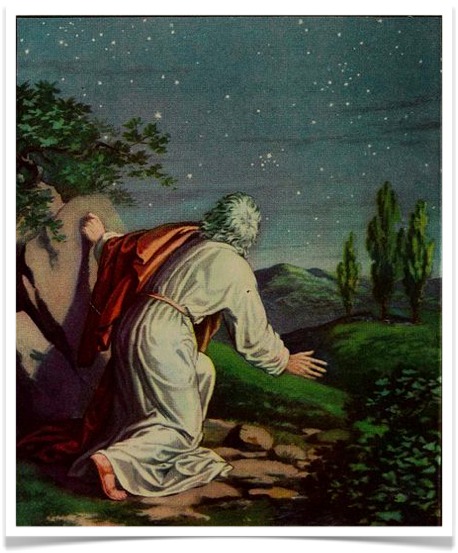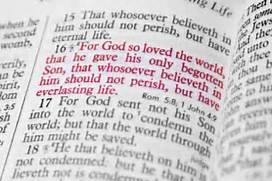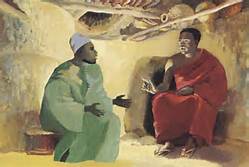“Live in God’s Light!”

John 3:14-21 (3:19-21) – March 10, 2024
Remember getting report cards in school? What about yearly reviews from your boss, or your supervisor? Those can be very stressful, even upsetting. People in authority can have real power over us, and sometimes negative influence, too. Can you remember if you had any mean teachers? Unfair bosses? What about rotten coaches? Getting checks or bad marks on a report card, or a reprimand from a manager at your work?
This Scripture reading is early in the rabbi Jesus’ ministry. Jesus had already made a name for Himself, with the tremendous teaching He had done and the wonderful miracles He had performed. So, a lot of people were talking about Jesus, this itinerant rabbi from Galilee. Even the most important leaders among the Jews, the Pharisees, were talking about this Rabbi Jesus. One of the Jewish leaders summoned up enough courage one night to sneak over to where Jesus was staying. Nicodemus wanted to know more about Jesus.
Here in John chapter 3, our Lord Jesus and Nicodemus have a long conversation. There is so much fascinating material here! I could preach so many different sermons from this one reading alone. But, I wanted to focus today on the last part of the reading.
Listen again: “the light has come into the world, but people love the darkness rather than the light, because their deeds are evil. 20 Those who do evil things hate the light and will not come to the light, because they do not want their evil deeds to be shown up. 21 But those who do what is true come to the light in order that the light may show that what they did was in obedience to God.”
I suspect you and I and many people around the world know John 3:16. This much beloved verse is one of the dearest and most memorized Bible verses of all time. “For God so loved the world that God gave His one and only Son, that whoever believes in Him shall not perish, but have eternal life.” But, what about several verses further on? Does God really give us all a heavenly report card? Does everyone get bad marks from God, because “people love the darkness rather than the light, because their deeds are evil?”
So often people “do not want their evil deeds to be shown up.” We humans run from the light of God! A vivid image that comes to the mind of commentator Rev. Sharon Blezzard was that of “cockroaches scurrying when the lights are turned on. Being exposed, being vulnerable, even in the loving and grace-filed light of Christ, runs counter to our [fallible] human nature.” [1]
The upright, law-following Jews of Jesus’ time tried their hardest to follow all God’s rules, to obey even the smallest rule in the Law of Moses set out in the first five books of the Bible, the Pentateuch. Even the strictest law-follower among the Jews knows they fall down sometimes, and fail to keep strict adherence to the Mosaic Law code.
It doesn’t matter whether we are talking about the strict law-followers two thousand years ago, or upright believers in God today. Telling ourselves that we are good and right and following God all the time is so human, so natural! Sadly, many people “want to keep our evil desires, our sinful expressions, and our selfish ways hidden in the shadows. In fact, we’re pretty adept at adapting to the darkness and fooling ourselves into all sorts of pretty little lies and heady rationalizations.” [2]
The Bible calls this the natural state of people. We often see people in their natural state feeling frustrated because they are fooling themselves, and want to wallpaper over that hidden darkness in their lives, where they trip up or even turn away from following God.
I recognize that so many of our fellow humans judge every little thing. Don’t you know a few people – even more than a few – who have frowns on their faces, their hands on their hips, or shake their fingers at certain people? And, if these disapproving, judgy folks judge you and me, it can really hurt! How much more does it hurt for us to get judged by God? Could we be fooling ourselves? Is each of us going to get a bad report card from God, with failing grades in following Jesus? This is such a helpless, hopeless place to be!
But, thanks be to God! This helpless, hopeless place is not the end of all things. No, we have the blessed truth of John 3:16 to turn to! For God so loved the world.
Some people cannot get past the words “God so loved the world.” If they trust that God loves them, they think God can’t possibly love their awful neighbor. Or the guy who cussed them out. Or the lady who is always really mean. God can’t possibly love them? God loves the world – except for those people from a certain country overseas. Or, except for those homeless people or undocumented people. Or, except for those people who believe something really weird about God. Or, well, you get the idea.
Let’s try an experiment. I am going to say John 3:16 several times, except with little changes each time. Here goes. For God so loved the world that he gave his only Son, so that everyone who believes in him may not perish but may have eternal life.
Second time: imagine someone saying this to you. For God so loved (person’s name) that he gave his only Son, so that if (person’s name) believes in him, (person’s name) may not perish but may have eternal life. And, the third time, say this to yourself. For God so loved me that he gave his only Son, so that if I believe in him, I may not perish but may have eternal life. [3]
Has anyone ever said that to you before? Jesus means it. He truly does.
What this reading is doing is giving all of us permission to get out of the condemnation business! Jesus did not come to condemn us. [4]
Jesus shines His loving, grace-filled light into the darkness and shadows of our hearts and loves us anyway. As I say each week in the Assurance of Pardon: believe the Good News! The Lord will never waver in persistent, caring love for each of us. And, that is a promise that is faithful and true – we have the words of Jesus on it.
For God so loved the world. Even you and me.
Amen.
(Suggestion: visit me at my other blogs: matterofprayer: A Year of Everyday Prayers. and A Year of Being Kind . Thanks!
[1] https://www.stewardshipoflife.org/2015/03/living-in-the-light/
[2] Ibid.
[3] https://www.umcdiscipleship.org/worship-planning/depths-of-love/fourth-sunday-in-lent-year-b-lectionary-planning-notes/fourth-sunday-in-lent-year-b-youth-lessons
[4] https://www.umcdiscipleship.org/worship-planning/depths-of-love/fourth-sunday-in-lent-year-b-lectionary-planning-notes/fourth-sunday-in-lent-year-b-preaching-notes





